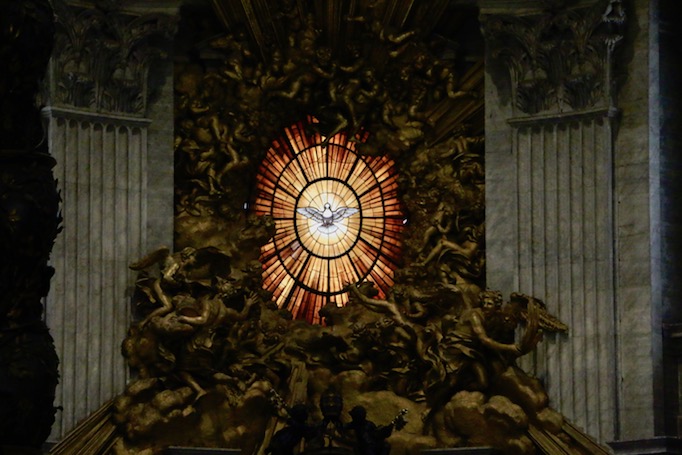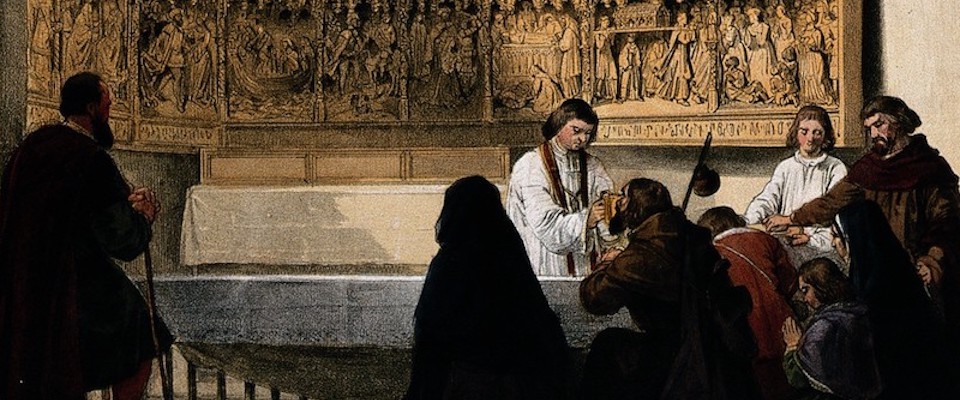Since the pontificate of Blessed Paul VI, the Ordinary form of the Roman Rite has been without one of the “greatest octaves” which critics argue has led to a detrimental effect on the Church’s liturgical life.
On the Monday after Pentecost in 1970, so the story goes, Blessed Pope Paul VI rose early and went to his chapel to celebrate Mass.
Instead of the red vestments he expected, green ones were laid out for him. He asked the Master of Ceremonies, “What on earth are these for? This is the Octave of Pentecost! Where are the red vestments?”
“Your Holiness,” replied the Master of Ceremonies, “this is now The Time Throughout the Year. It is green, now. The Octave of Pentecost is abolished.”
“Green? That cannot be,” said the Pope, “Who did that?” “Your Holiness, you did.” And, the story concludes, Paul VI wept.
The authenticity of the story remains in question, but it points to the deep sadness many Catholics felt when the Pentecost Octave was abolished in the Ordinary form of the Roman Rite, a time that used to be one of the most cherished moments of the Church’s liturgical year. Indeed, it is regarded as the Church’s second greatest feast, the first being Easter. Blessed Cardinal John Henry Newman called the breviary offices of Pentecost and its octave perhaps the “grandest” of the liturgical year.
“The Pentecost octave is extremely ancient — developed in the first millennium — and was always seen as ranking beside Christmas and Easter as one of the three great octaves of the liturgical year,” said Peter Kwasniewski, associate professor of theology at Wyoming Catholic College.
Pentecost used to be particularly well known for being one of the times in the liturgical year for Christian Initiation, based on Acts 2:38-41, and the octave was significant as the neonati appropriately wore white robes (hence the alternative name for Pentecost of ‘White Sunday’, or Whitsun) until the following Saturday.
So important was the octave that some Catholic countries had kept Pentecost public holidays on the Monday and Tuesday, leaving the hierarchies of those countries embarrassed when the Church had erased hers from the liturgical calendar.
Some steps have been made to partially restore it, for example allowing the readings from the Mass of Pentecost Sunday to be repeated on the Monday and Tuesday. But by and large one does not find it in the Ordinary form of the Roman Rite. Most Catholics today are unaware it ever existed.
Critics say this has had various detrimental effects on the Church’s liturgical life, not least because the celebration of octaves answers to a fundamental human need: to linger over something momentous, to savour events rich in meaning, the need to prolong a feast.
“It’s not only illogical, but profoundly anti-liturgical not to have this octave anymore,” said Kwasniewski.
Writing on the New Liturgical Movement website, Father Guy Nicholls of the Oratory in Birmingham, England, laid out a series of negative effects of losing the octave. Among them, he said, is that Pentecost is reduced to a “mere end point,” supplanted by Ordinary Time.
“Thus Pentecost now seems only to look backwards to Easter” rather than “both back to Easter and forwards towards ‘green time’ representing the post-Pentecostal life of the Church until the Second Coming,” he wrote.
He also put forward the thesis that reducing Pentecost to a “one-day wonder” leaves a vacuum which “charismatic pentecostalists” and their “non-liturgical character” would “seek to fill.”
The overall end result, critics say, is that the Holy Spirit is not given adequate attention and reverence in the Church’s liturgical calendar, and it’s perhaps therefore unsurprising that the Paraclete remains the “neglected Person of the Trinity.”
“Of course,” said Kwasniewski, “they say that Paul VI wept over the loss of the octave, which he had signed into effect but, as was typical, didn’t notice at the time.”
The Pentecost octave continues to be celebrated in the Extraordinary form of the Roman Rite and in the liturgy of the Anglican Ordinariate.
***
Here below is a family prayer that can still be prayed during these eight days after the Feast of Pentecost, even though the octave no longer exists in most of the Church.
Family:
Alleluia, the Spirit of the Lord has filled the whole world. Come, let us adore Him, Alleluia.
Father:
Let us pray. O God, on this day Thou didst teach the hearts of Thy faithful people by the light of Thy Holy Spirit; grant us by the same Spirit a right judgment in all things and ever to rejoice in His consolations. Through Christ our Lord.
Family:
Alleluia, Alleluia.
Father:
Send forth Thy Spirit, and they shall be created; and Thou shalt renew the face of the earth, Alleluia Alleluia.
Family:
The Spirit of the Lord has filled the whole world, Alleluia.
Father:
And He who embraces all things knows every spoken word, Alleluia.
Family:
The charity of God is poured forth in our hearts by the Holy Spirit who has been given to us, Alleluia.







